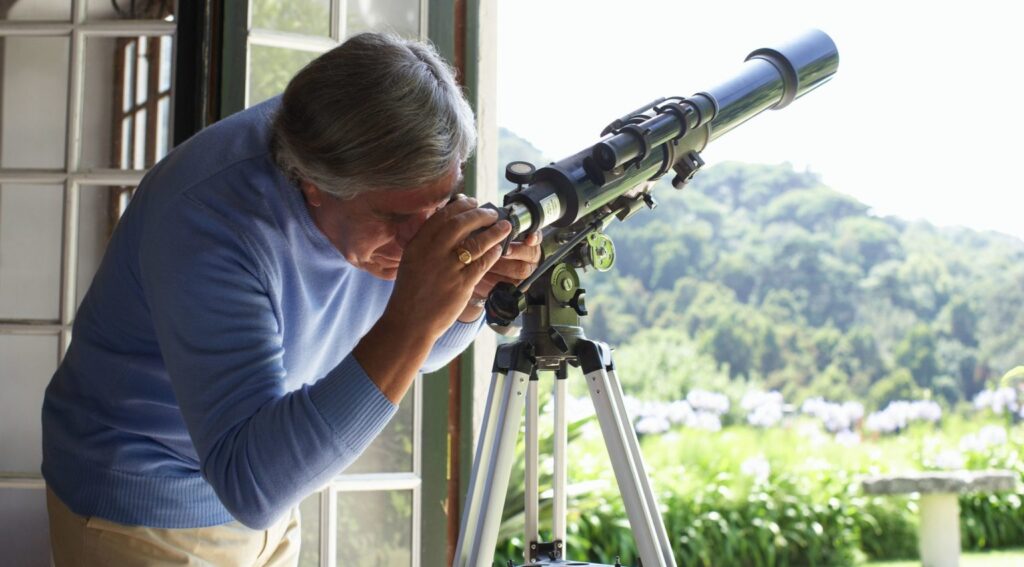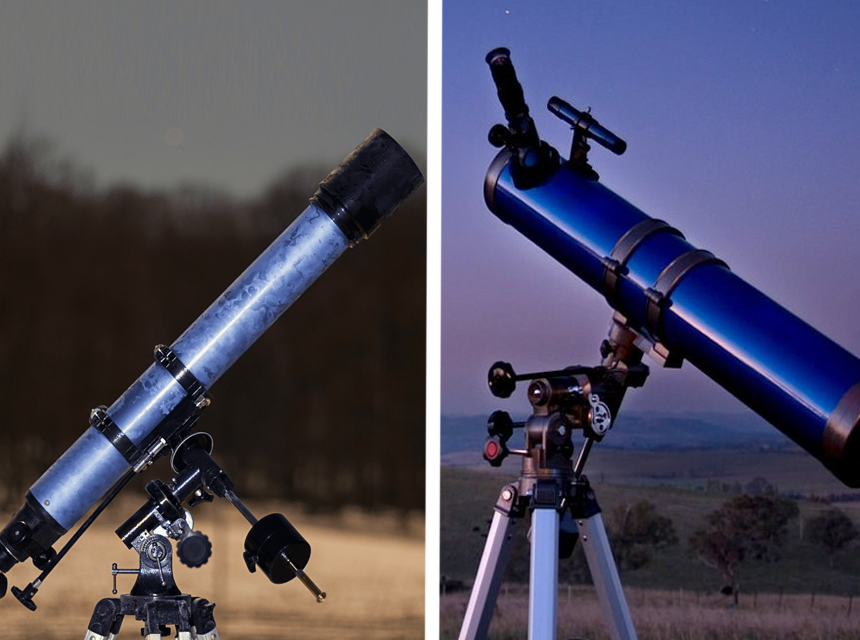You might never know how beautiful our galaxy is until you see it for yourself. You see the world around you every day, but what about the one beyond the sky? With the best portable telescope, you can quickly turn your regular camping trip into an exciting discovery adventure.
We have summed up all the essential features you need to know to find the best portable telescope. We first considered the type – reflector, refractor, and catadioptric – which means the optical material used in making the telescope. Another feature we looked at is the aperture size, which also significantly affects the sharpness and brightness of the image the telescope produces. We didn’t stop there, we examined the focal length, mounts, eyepieces, and other features we know would guide you into making the right choice. To ensure we can provide you with all the information about these 9 best portable telescopes, we spent multiple hours researching and going through customers’ reviews and specifications. We came out with nine great products with the Emarth 70mm Refractor Telescope as our Editor’s Choice and assembled them in the table below.
More features: comes with a carrying bag; features a 5×24 Finderscope with bracket
This is a refractor telescope that many users love. It’s coated glass with multiple layers is guaranteed to produce sharp and bright images. The model comes with two eyepieces, K10mm and K25mm, with 36X and 14X magnifications. With the two entirely different eyepieces, you’ll be able to see all the main celestial bodies clearly. The Barlow lens included can also multiply each eyepiece’s power by three times. In addition, it has a finderscope which comes with a mounting bracket and helps you find all the objects currently visible.
This telescope isn’t solely designed for moon viewing; however, it can also be used on scenery or birdwatching. Moreover, it has a smartphone adapter to capture a great moment on your device. Not only that, it has all the accessories that will make your observation worth a while. The other accessories include a tripod stand and a carrying bag.
It is suitable for beginners who don’t have experience using a telescope as it is pretty easy to assemble and erect. The tripod stand provides strong support for the device. You can track a deep object with the help of the mount, and you can also position it at a place where you can quickly scale through. The satisfaction that comes with looking at the galaxy and various planets is what makes the users of Emarth telescope decide to stick with the product.
More features: includes a backpack, a universal smartphone adapter, and full-size binoculars
This refractor telescope comes with a 70mm aperture which is typical for most travel models. Users love this product as it is super easy to set up, that’s why it is so ideal for kids and beginners. It also features full-size binoculars which provide you with a 10X magnification and 50mm objective lens so that you get a broad view of terrestrial objects around you. They are fashioned with multi-coated optics, and this makes events like sightseeing and bird watching an unforgettable moment. The package also includes a backpack suitable for storing and carrying the accessories
This model’s focal.length is 400mm which makes the focal ratio f/5.7. Besides, it features two eyepieces of 9mm and 20mm in size, that boast 44X and 20X magnification accordingly. Not only this, it includes a smartphone adapter, this enables you to capture the images and also record it as a video. A tripod stand has been added to allow for it to stand well on any type of platforms. It is made of aluminum, and this is responsible for the weight it possesses. You don’t have to worry about stability with this type of stand as it was designed to fit any kind of surface, mountain inclusive.
MaxUSee Travel Scope is excellent for astronomical observation. You get to watch your favorite planets and other bodies like asteroids and comets. The experience is superb and it will definitely worth your while. It is an ideal telescope for the family and perfect for travel.
More features: comes with 45° erect image diagonal and a travel backpack
This travel scope boasts eyepieces (20 mm and 10 mm), 45° erect image finderscope, travel backpack, and diagonal prism. The eyepieces provide completely different magnifications to look at your targeted objects. Its 5×24 finder scope lets you focus on an object for thorough observation. It features an altazimuth mount as well for effective tracking.
This scope is very powerful, and users can see the planets, the moon, and other deep sky objects. The backpack included makes it easy to assemble the accessories and keep them secured until further use. It serves as home for the telescope, and this useful storage would also elongate the lifespan of all the items inside it. With the telescope’s bag, traveling with your device would be hassle-free. It also features an adapter, and you can record your observation as a video or capture it as a picture.
Furthermore, a tripod stand has been included to provide a stable foot when setting it up in any kind of place. The tripod stand is made of aluminum, and this is responsible for its light weight. Don’t worry about its stability, it was designed to fit any kind of surface. For expert astronomers who want a sophisticated device as well as for novices and high school students, this is the perfect choice. You won’t regret buying this telescope, and above all; it comes with a reasonable price.
More features: includes a CD copy of “The SkyX” planetarium program
Getting star locating telescope devices at a low price that matches your family’s budget is not impossible. Celestron 114LCM is definitely the one to go for in a situation like this. It effortlessly discovers thousands of celestial bodies for you technically. The scope features a Newtonian reflector, GoTo technology, an impressive 1000mm focal length, and computerized mount. It also comes with a pair of eyepieces (9mm and 25mm in size) which provide you with 60X and 167X of magnification.
To start using it, just perform an easy SkyAlign alignment procedure by centering any bright objects in telescope’s lens. From there, the lowest ordinary multiple will calculate the date, site, time and orient itself with the night sky. Browse the hand control’s information and choose any star, planet, galaxy, or nebulae within the info at each second interval, your lowest common multiple centers it within the lens and tracks it because it moves across the sky. The SkyAlign system is rather fast and straightforward to use. When you see a celestial object such as the moon, activate the scope, choose “Solar System Align”, enter the current date and time, target the device at the object, and press the “Enter” button. The telescope will adjust the image for you.
The scope is backed by a two-year warranty for your peace of mind. The manufacturer ensures that the provided accessories are more than enough for a novice, but as you develop with your hobby, it’s advisable to get some extra eyepieces and a moon filter for even more fascinating experience.
More features: adjustable tripod from 16’’ to 46’’, includes one smartphone adapter and one wireless camera remote, eyepiece 20mm – 15X, 6mm – 50X, Bluetooth controller, star map, magnification 15X-150X
With the 3 eyepieces and 3X Barlow lens, ToyerBee Refractor Telescope could offer a magnification of 15X to 150X. The ToyerBee refractor telescope was designed to provide views of the moon’s craters, Jupiter’s major moons, and Saturn’s rings. As a terrestrial telescope, the refractor telescope delivers great views of mountains, valleys, and many other features of the world around.
The focal length of the eyepiece, combined with the focal length of the telescope, determine the magnification power. To calculate the power of your telescope with any particular eyepiece, simply divide the focal length of the telescope (300mm) by the focal length of the eyepiece (indicated in “mm” on the eyepiece collar). For example, when you use the eyepiece H20mm with this telescope, the magnification will be 15X, and with a 3X Barlow lens, the magnification will be 45X.
The installation of the telescope is very simple. As long as you follow the instructions, you can install all the accessories in ten minutes. No extra tools are needed. You can explore the universe at any time. It has a 70mm objective lens and a focal length of 300mm. It has a good eyepiece feature, including20mm: 15X; 6mm: 50X. It has a magnification power of 15X – 150X. And it also boasts with customer reviews of 4.1 out of 5 stars in 2,180 reviews.
More features: comes with a carrying bag, smartphone adapter and a Bluetooth camera remote
This is a cost-effective and best quality refractor telescope that was designed to suit your needs as a beginner astrophotographer. Its visual resolution and optical capabilities are top rated with a low-end price. Assembling isn’t excessively difficult, someone with no experience of using a telescope can set it up effortlessly. It includes an instruction book which shows you how to assemble it even if you are an expert. The manufacturer and buyers claim the installation takes just about 15-30 minutes.
The Gskyer possess a 70mm aperture and 400mm focal length, which ends up with precise and high-resolution pictures. The f/5.7 focal ratio makes it an ideal option for deep sky objects observation. It has an alt-azimuth mount, two eyepieces with 10mm and 25mm sizes and a pretty lightweight tripod. Accessories added to the package include a smartphone adapter, a storage bag, and a remote Bluetooth camera remote. The adapter lets you take pictures of the extraordinary galaxies and other space objects. You can also record it as a video for further illustration.
The telescope is transportable and compact. You shouldn’t look down on this scope because of the price, it is one of the best space gazing devices on the market today: it has all the characteristics and accessories you need in order to get the best out of your telescope.
More features: includes an EZ Finder II reflex sight for aiming, eyepiece rack, collimation cap, and Starry Night astronomy software
This model is a reflector telescope that’s super easy to assemble and use. It’s an ideal telescope for amateur astronomers. The scope’s aperture is 114mm, and the focal length is 450mm: with this kind of focal ratio, bright and sharp images are produced. Sharp images enhance the visual experience of the user, as all critical objects would be captured vividly. It is a sophisticated telescope with a high-performance level: its steady mount provides smooth movement and positioning for a straightforward manual chase of celestial objects. Moreover, its two eyepieces are 6mm and 17mm in size which gives you a good choice of magnification. The package also includes an eyepiece rack which would keep your eyepieces in place when not in use.
The starry night software has also been added along with a collimation cap. It is suitable for family use as every member of the family is guaranteed to get maximum satisfaction: doesn’t matter if it’s a kid or an avid grown-up astronomer. Looking at all the features, one might think it will cost a fortune to own a telescope like this; but not to worry, it is moderately priced scope for under $200. It is beginner-friendly as the setup is quick and easy. Aspiring astronomers should go for this not only because of the crisp images you get, but also its overall simplicity.
More features: lightweight aluminium tripod; comes with a backpack and the Orion MoonMap 260
The Orion 10034 GoScope II is a well-planned refractor telescope for distant and superior kinds of viewing. Space gazers love this telescope for its amazing picture and magnification allowing you to see all the distant celestial objects. The scope features a 70mm aperture, and a 400mm focal length, permitting you to envision celestial bodies and particularly the moon in extraordinary detail. The unit comes with a pair of eyepieces which are 25mm and 10mm in size. It’s clear why this product is one of the best travel telescopes out there. Besides all these specs, the purchase includes the Orion MoonMap 260 and a backpack for easy transportation.
The Orion telescope is exceptionally lightweight, with the stand created out of aluminum which adds to its portability. It’s also great for astrophotography providing you with clear and precise pictures. However you’ll need to purchase a separate adapter for your smartphone or camera.
It also has an altazimuth mount with which you can track objects no matter their position. You will get full insight into any planets and other celestial bodies you wish to see. Many customers advise getting a moon filter for more explicit moon images. If you are looking for a telescope which will offer the best of both world experience, then you should go for this one.
More features: Multilayer Glass Green coated optics; includes a 10mm smartphone eyepiece adapter
This package contains all you need in a telescope. It has a pair of eyepieces enclosed in it, a 25mm for 28X magnifications and a 9mm lens for 78X. You don’t need a chart to make use of the telescope. Merely enter the time and date, then face the telescope at three luminous stars. This particular product will be able to tell you the star names, and other valuable information you need to know.
High school students love the Celestron 60LCM due to its size. Its lightweight construction makes it easy to be carried around. Most stargazers don’t want a manually operated telescope simply because it often takes too much time to assemble especially if you are using it away from home. A processed telescope could take time to line up; if you do not enter the time correctly, the alignment could fail. No manual setting is required when you choose this particular device: the hard work has already been done for you. Users find it fascinating to watch almost everything they like to see through this telescope. It surpasses many of its competitors by offering more features that would enhance the experience of the user. With this scope, maximum satisfaction is guaranteed. A hassle-free computerized device is a real deal for someone who doesn’t want all the stressful work of entering time, date, and other data before getting the feel of the galaxies.
Below is a comprehensive explanation of the essential features a portable telescope has so that you could be more confident about your final choice.
Most sky gazing lovers dream of a telescope. The regular home version is excellent for observation, and you will enjoy its work until you feel the need to observe the space while on the go. Portable telescopes solve this problem as they can be carried around easily. Their weight is one of the most significant factors that contribute to its portability. With a device that weighs just around five pounds or so, it’s so easy to take it wherever you go to enjoy the views of our galaxy while being surrounded by beautiful nature.
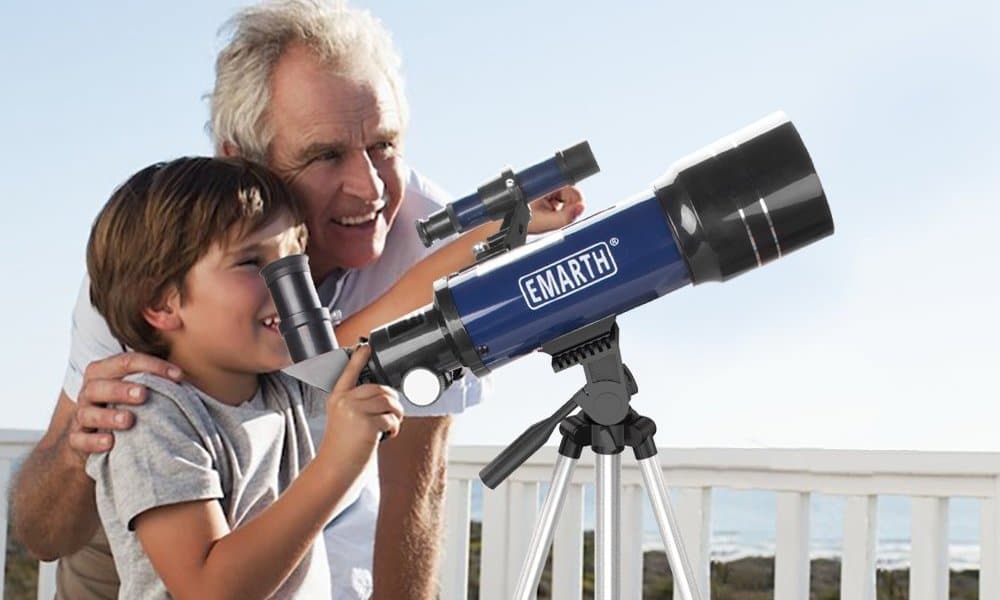
Wondering what features you should look for in a telescope? It helps when you know precisely what to look for in a telescope before you spend a fortune buying it. Many people feel frustrated if the brand they purchased couldn’t fulfill its purpose, this can be daunting especially if you are a beginner. What telescope should you buy? You can use the following explanation as a guide to enable you to choose the right telescope.
It’s crucial to look at the kind of telescope you want to buy. There are three main types, reflector, catadioptric, and refractor. The reflector makes use of mirrors while catadioptric uses mirrors and lenses, and refractor utilize lenses as their optical material.
Reflector telescopes – The reflector uses glossy surfaced mirrors to gather light, after which it then cast a reflection of the image. The light collected at the rear mirror is transmitted into the eyepiece.
Refractor telescopes – The refractors utilize various lenses to gather the light which it then reflected to the eyepiece. Refractors are able to transmit 90% of the light rallied in them. They are long-lasting and easy to maintain.
Catadioptric – Catadioptrics transmit 64 to 75% of the light it has collected. It combines all features of reflectors and refractors, and this is because it uses both lenses and mirrors to gather light.
The aperture size is also one of the features you should consider when choosing a telescope. Aperture size is the diameter of the mirror or lens which gathers the light. The size of the aperture determines how bright and sharp the image will be. Taking into account, a refractor telescope should have a 6-inch (150 mm) mirror at least while a reflector requires a 4-inch lens. The Celestron 21035 is an example of a refractor telescope with an ideal proportion: 70mm aperture and 400mm focal length.
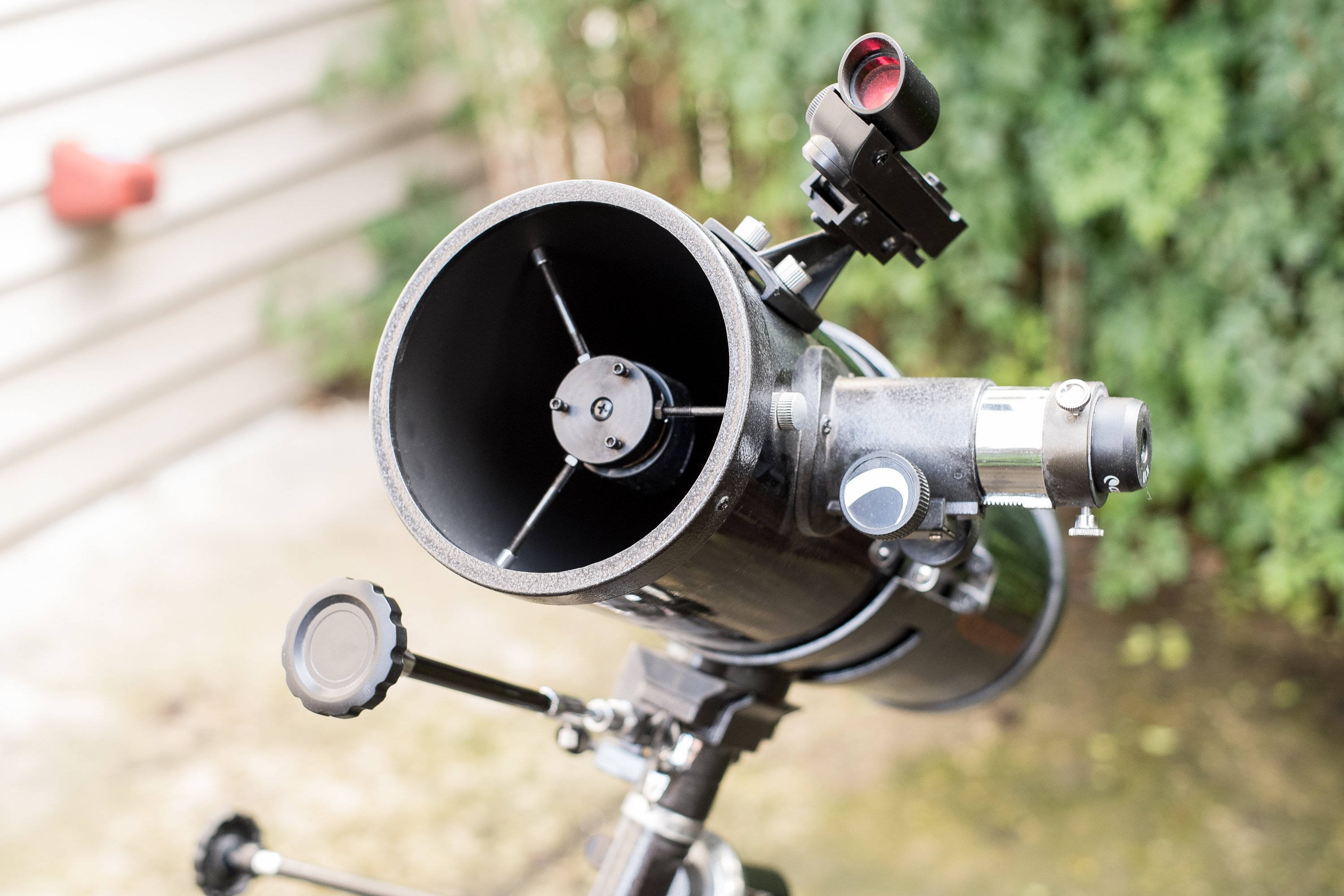
Another feature you should consider is the focal ratio. It is known as the speed of the optics. This characteristic depends on the focal length. You should look out for this crucial feature, usually the longer, the better. Use the following as a guide for focal ratio range.
f/3 to f/5 = fast, but lower power; best for deep space photography and observing full field
f/6 – f/10 = slow, but higher power; best for narrower field viewing, photography of the moon, the planets, and binary stars
Mounts are also a vital part of the telescope. They are used to track an object; thus they make movement easy during observation. The two types of mounts are equatorial and altazimuth. Equatorial mounts have the ability to rotate and follow an object from one axis. This type of mount is great for astrophotography. The altazimuth can follow objects on two axes with the rotation of the Earth. It can move horizontally and also vertically. Alt azimuths are cheaper, more portable, and easy to use. It also needs manual operating which can become tedious over time.
When talking of eyepieces, the focal length should be taken into account as well. Focal length and eyepieces work hand in hand. One thing most people don’t know is; the higher the eyepiece size, the lower the magnification is and vice versa. Usually, manufacturers include two or three eyepieces of focal length between 5mm – 35 mm range.
Besides all the above features, there are many other ones you can check to make sure you buy an ideal telescope which is going to meet your needs. One of these things is the dimension of the telescope.
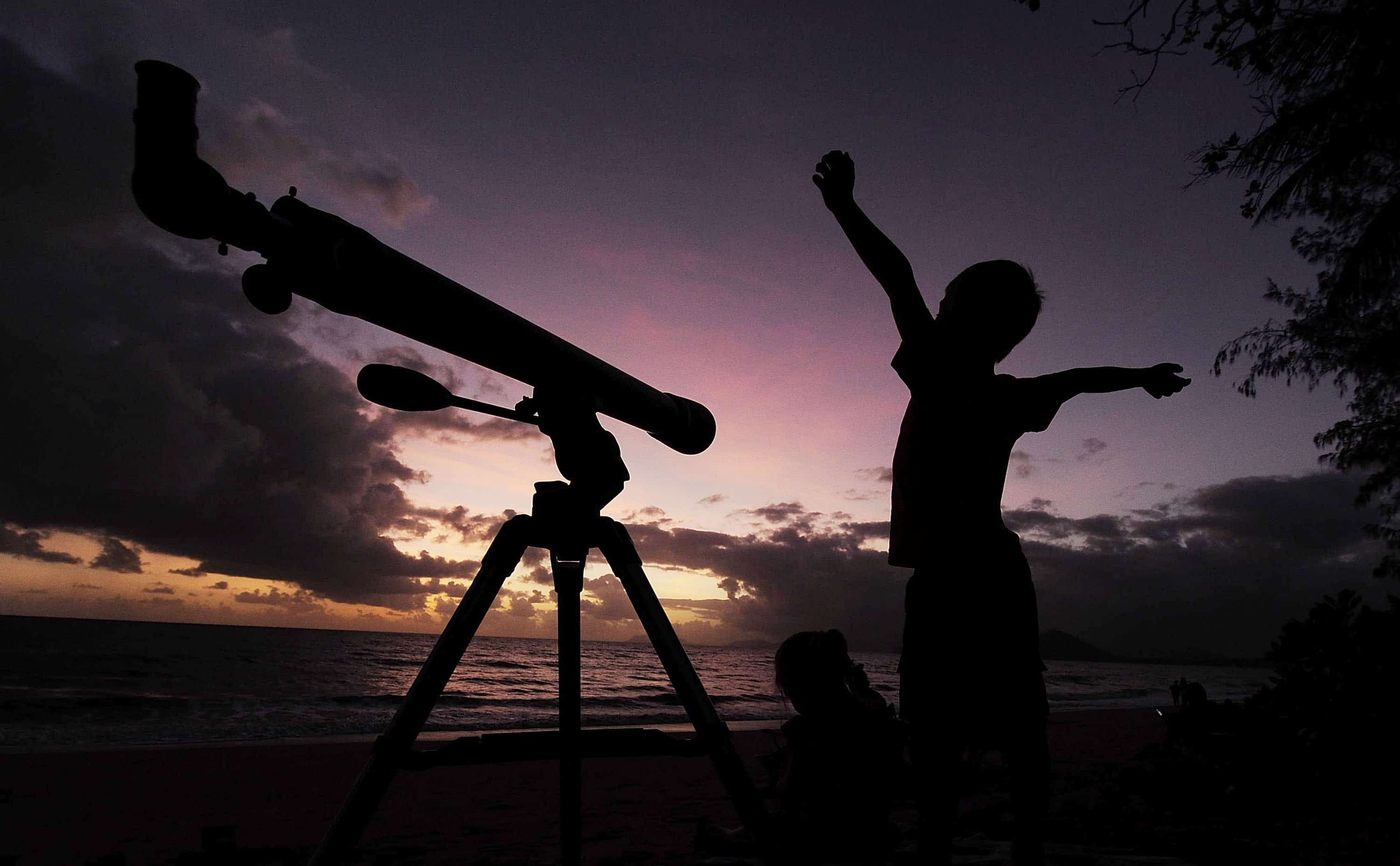
You should also check the warranty for the product you are buying. There should be at least a 12-month warranty on the telescope, and this is to guarantee you that you are covered in case the telescope develops a technical problem.
Also, the accessories which accompany the product should be checked – whether it has a tripod, a Barlow lens, a carrying bag, etc. Believe us, when we say, that high-quality telescopes are often met within $300 and $500 price range.
Our overall best portable telescopes are Emarth Refractor Telescope, MaxUSee Travel Scope 40070W1050, and Celestron 21035.
The Emarth Refractor Telescope comes with two eyepieces, K10mm and K25mm, with 36X and 14X magnifications. With the two entirely different eyepieces, you’ll be able to see all the main celestial bodies clearly. It can also be used on scenery or birdwatching.
Up next is the MaxUSee Travel Scope 40070W1050. Apart from the high-quality refractor telescope itself it also includes a backpack, a universal smartphone adapter, and full-size binoculars which come in handy for birdwatching or even hunting.
Our third best portable telescope is the Celestron 21035. It boasts eyepieces (20 mm and 10 mm), a 45° erect image finderscope, a travel backpack, and a diagonal prism. The eyepieces provide completely different magnifications to look at your targeted objects.

